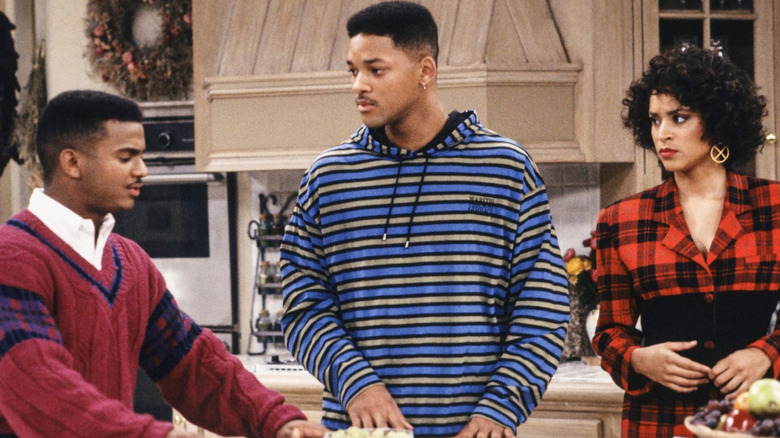
Will Smith may well have conquered the globe (or at least he had before the 2022 Oscars debacle). But no matter how many films he stars in, how much critical acclaim he garners, or how much money the man makes, he's always struggled to be respected in the hip-hop world. Try as he might, the West Philadelphia native cannot escape the "corny" label, and as HipHopMadness' video "Why Hip-Hop Doesn't Respect Will Smith" posits, Smith is consistently overlooked when it comes to lists of the top MCs.
Some of that had to do with his decision not to curse in his raps, but there's more to it than that. In his memoir "Will," Smith claimed his "middle-class upbringing contributed to the constant criticism" and addressed the struggle to gain legitimacy in hip-hop (via Insider):
"My story was very different from the ones being told by the young Black men who were launching the global phenomenon that would later become hip-hop. In their minds, I was somehow an illegitimate artist. They would call me 'soft,' 'whack,' 'corny,' a 'bubblegum rapper,' criticisms that violently infuriated me."
But the fact is, if you look at Smith's accomplishments in hip-hop, there's absolutely no reason for all the hate. In fact, going by the usual metrics of what makes a rap legend, he's outdone pretty much everyone. Grammys? Four. Multiple platinum albums and singles across decades? Check. And all accomplished while becoming the biggest leading man in Hollywood. If that wasn't enough, with "The Fresh Prince of Bel-Air," Smith almost single-handedly cemented hip-hop as a fixture of mainstream culture.
In 1990, Hip-Hop Still Had A Long Way To Go
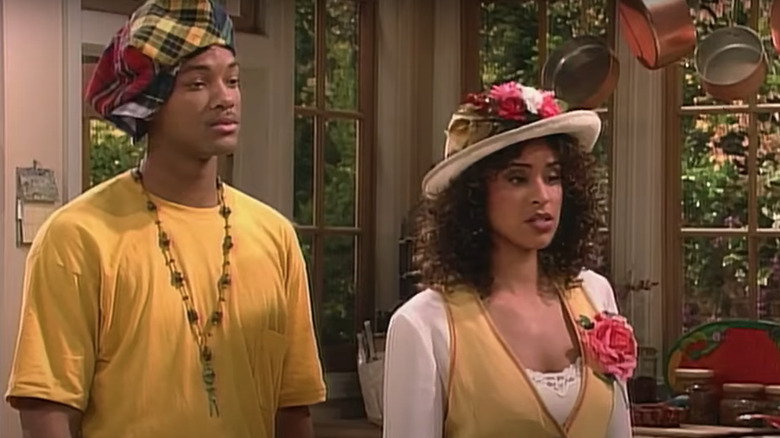
When "The Fresh Prince of Bel-Air" debuted on NBC in September 1990, hip-hop wasn't the pop culture-defining mainstay it is today. Younger generations embraced the genre, with hip-hop blooming from a subculture that sprung organically from the block parties of the South Bronx. That was the year MC Hammer released his massively popular single "U Can't Touch This," A Tribe Called Quest debuted to critical acclaim, and Ice Cube broke free from N.W.A and launched his solo career with the classic album "AmeriKKKa's Most Wanted."
But despite this success, the culture itself would have to endure a decade of conservative backlash before it could gain full mainstream acceptance. Republican senator and presidential candidate Bob Dole spent the mid-90s decrying the rise of gangsta rap. That drew the ire of Tupac Shakur, who addressed Dole in his song "How Do U Want It?" with the line "Mr. Bob Dole, you're too old to understand the way the game's told, you're lame so I gotta hit you with the hot tracks." The rapper also took aim at Democrat politician and civil rights activist C. Dolores Tucker, who waged her own war on rap by denouncing it as "pornographic filth," and buying stock in record companies so she could protest at their shareholders' meetings.
It wasn't just a few uptight politicians opposing hip-hop. Dole and Tucker were representative of the views of older conservatives across the country, who couldn't reconcile the hard-hitting and subversive nature of hip-hop with their vision of America — even as white suburban kids made the genre nationally popular.
The Genesis Of The Fresh Prince Of Bel-Air
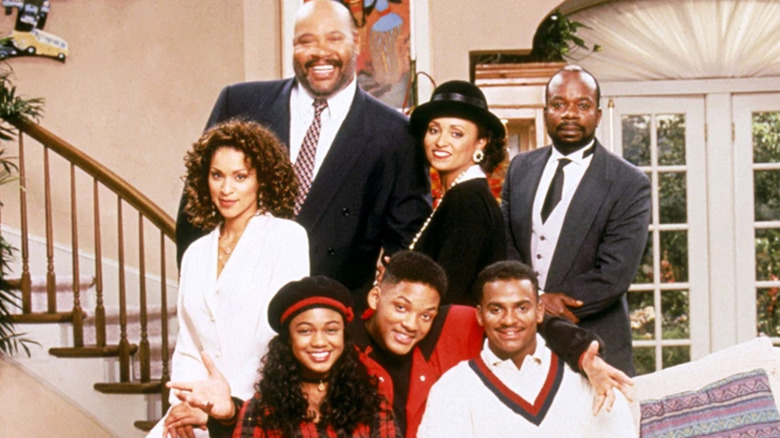
In 2023, it seems silly to think of politicians, especially Democrats, getting wound up over music. Imagine Joe Biden taking a stand against "WAP," or Kamala Harris having a meltdown over "Munch." Back in the '90s, however, rap music was a much more controversial issue — one which would only start to resolve as artists continued to be embraced by younger generations. And a key part of getting the kids onboard to aid in that journey towards mainstream acceptance was hip-hop's expansion into other areas of pop culture, particularly film and TV.
At the start of the decade, Will Smith was known as part of the duo DJ Jazzy Jeff and the Fresh Prince, who'd earned a Grammy for their 1988 hit "Parents Just Don't Understand." While politicians and conservative America were busy having a hissy fit over rap lyrics, mega-producer Quincy Jones -- best known for his work with Michael Jackson -- had convinced NBC to take a punt on Smith and the rising popularity of hip-hop by greenlighting a new sitcom starring the young rapper.
Smith, who hadn't acted before, was basically an unknown in Hollywood. The New York Times noted as much when it ran an article about "The Fresh Prince of Bel-Air" and its experiment to "put rap in [the] mainstream." NYT said the highly-anticipated series was "based on an untried premise, leans on associations with a musical genre unknown to many viewers, and stars a 21-year-old who never acted before." Even NBC was unsure about basing so much of the show on hip-hop culture, and according to the co-writer of the pilot Susan Borowitz, "freaked out" when she submitted the script.
How The Fresh Prince Brought Hip-Hop To The Mainstream
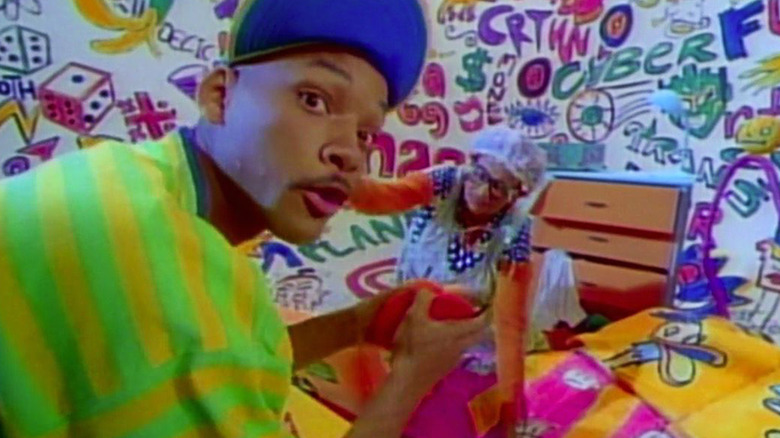
NBC needn't have worried. "The Fresh Prince of Bel-Air" proved immediately popular after its debut. Though the show was undeniably a sitcom, it often dealt with heavy themes. The season 4 episode, "Papa's Got a Brand New Excuse," is still cited as one of the most emotionally affecting episodes of TV ever, and a high point of Will Smith's acting career.
And the whole time it was transcending its sitcom framework, "The Fresh Prince" was bringing hip-hop culture to the living rooms of America. Will Smith, whose apparent corniness had thus far been a sticking point, suddenly found his non-threatening aura a benefit, perfectly placed to bring hip-hop to the masses. As such, the show used elements of Smith's real life, including his name, his fashion sense, and his being from West Philadelphia. Smith's style was about as overtly hip-hop as you could get — especially in the earlier seasons. Be it flipping his private school jacket inside out, his oversized shirts and pants, or the influence of Afrocentric style, Smith brought the look of hip-hop -- particularly the more conscious variety -- into the mainstream.
And there was, of course, the music. From the moment the title sequence started, the show wore its hip-hop influence on its sleeve. Smith's opening rap not only became a popular title theme but one of the most recognizable songs of the '90s, at least for the generation that grew up on "The Fresh Prince." Even in the U.K., back when I dared to venture out into the hellscape that was nightlife on the South Coast, the "Fresh Prince" theme song would reliably find its way into DJ sets and usually got a bigger reaction than other songs.
'The Final Piece'
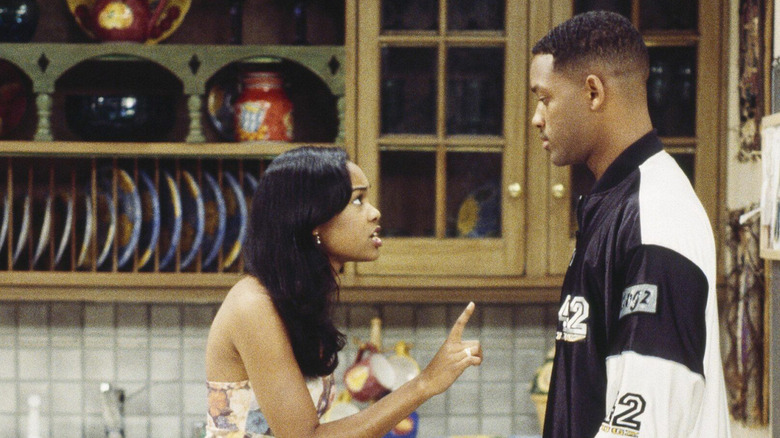
The man who helped bring "The Fresh Prince of Bel-Air" to fruition agrees. In a Time interview, executive producer Quincy Jones noted that "African-American music and culture has always been a barometer for a coming social change in America." And that by the time "The Fresh Prince" arrived," hip-hop artists were "selling millions of albums a week," to the point, "you had white kids in Iowa walking around with their baseball caps on [backward]."
But for the producer, it was Will Smith and his show that helped hip-hop gain full-blown mainstream acceptance: "I think 'Fresh Prince' and the success of the show was the final piece that cemented hip-hop into the pop culture lexicon." The rapper Murs agrees -- as he said in a HipHopDX video, the show "brought hip-hop into homes around the world in a form that was authentic yet palatable. It showed millions and millions that were unfamiliar with the culture that not all rappers were violent, ignorant, or unintelligent."
That's partly why I was so excited about the "Fresh Prince" reunion. Watching the show growing up, to my friends and me, Will Smith was an emissary sent from a subculture we didn't understand but badly wanted to be part of. And that was kind of the point. He made hip-hop accessible to kids like me, all the way in small-town England. Along with "Kenan and Kel," "Sister, Sister," "Moesha," and a ton of other shows led by African-American actors and steeped in hip-hop culture, "The Fresh Prince" was our first exposure to a movement that would eventually take over the world. And by the time it did, we were all for it, thanks in large part to shows like "The Fresh Prince of Bel-Air." Just remember that the next time someone says Smith is "corny."
Read this next: The 15 Best Comedy Movies From Black Directors
The post Quincy Jones Thinks The Fresh Prince Of Bel-Air 'Cemented' Hip-Hop In Pop Culture appeared first on /Film.
0 Commentaires